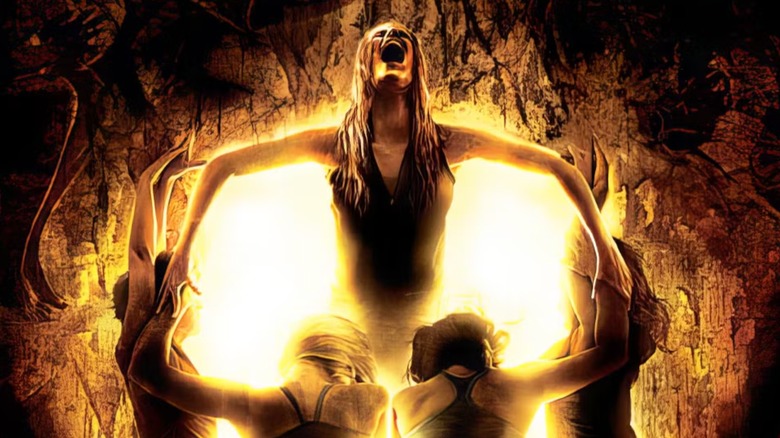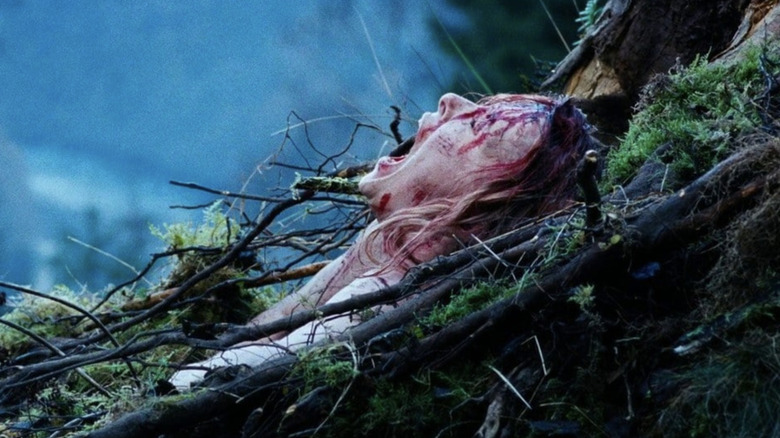The Descent's Director Disowned The Horror Movie's Alternate Ending (For A Good Reason)
Neil Marshall's 2005 horror movie "The Descent" has a brutal ending, delivering a masterfully executed rope-a-dope gut punch for our heroine Sarah (Shauna Macdonald).
Let's recap: Sarah loses her daughter Jessica (Molly Kayll) and her husband Paul (Oliver Milburn) in a car crash. After a year of grieving, she and five friends, all extreme sport enthusiasts, go on a spelunking trip in Appalachia. They wind up in an uncharted cave system and are hunted by bat-faced troglodytes. Most of the girls are picked off, but Sarah and Juno (Natalie Mendoza) descend into warriors, as savage as the cave dwellers hunting them.
Sarah leaves Juno behind after learning that she (accidentally) killed their friend Beth (Alex Reid). Adding insult to injury, Juno was sleeping with Paul before his death. Sarah climbs out of the cave, reaches the surface, and makes it safely to her car ... and then sees a ghostly Juno sitting next to her. That snaps her back to reality, where she's still in the cave with no hope of rescue. Sarah imagines Jessica with her, a birthday cake between them, and smiles.
If you first saw "The Descent" in an American theater back in 2006, though, you wouldn't have gotten that last scene. After the movie's initial run in the UK, it was picked up for US distribution by Lionsgate. Test audiences didn't appreciate the downer ending, so at the studio's request, Marshall trimmed the end off the movie. The fake-out ending of Sarah's escape became the actual ending, with the movie cutting to black once Sarah sees Juno and screams.
For the 20th anniversary of "The Descent," Marshall spoke with Empire and said the original ending is "the only ending there is, as far as I'm concerned." The director similarly writes off the cash-grab sequel, "The Descent Part 2," that ran with the storyline of Sarah surviving and escaping. While some might describe the recut American version of "The Descent" as having a "happy ending," because Sarah does get out alive, Marshall doesn't see it that way.
Neil Marshall doesn't think either of The Descent's endings are happy
Compared to the original ending, the alternate ending of "The Descent" feels cowardly and afraid to end on a truly dark note. Yet for some, the American version is the superior one because it isn't so bleak and hopeless, as /Film's BJ Colangelo has written.
Marshall, though, thinks there was no happy ending for Sarah either way. She may escape the cave monsters in the American ending, but her own personal demons are still going to haunt her. She did leave Juno behind to be killed, so it's no coincidence that she sees Juno haunting her. Sarah hasn't healed from her trauma, she's gotten plenty more of it, and it's even worse because she's now lost her friends too.
Marshall told Vulture in 2021 that American ending "reminded [him] of the end of 'Texas Chainsaw Massacre.'" That movie ends with blood soaked final girl Sally (Marilyn Burns) escaping cannibalistic killer Leatherface (Gunnar Hansen) in the back of a pick-up truck. Leatherface spins around with his chainsaw while Sally looks back at him, half-laughing and half-sobbing. Sarah, another blonde covered in blood, does resemble Sally by the end of "The Descent." Marshall continued:
"[Sarah] survives, but she's clearly out of her mind with fear and madness. So I don't see it as being a happy ending at all, having her get out of the cave."
Conversely, Marshall thinks his preferred original ending is the one that gives Sarah a happier conclusion. As he explained in the aforementioned Empire interview: "To my mind, there's no happiness for Sarah outside that cave. Her family's dead, her friends are gone, she's completely insane. The best version of it to me was Sarah being, in her head anyway, back with her daughter."
In either version of "The Descent," Sarah escaping the cave plays out like a fantasy: the abrupt return of daylight, the musical score getting discordantly triumphant, etc. Something is off about it, which pays off when it turns out it is a dream. Sarah's imagination giving her that fantasy, and her rejecting it, speaks to what Marshall has said about her arc. Sarah has accepted that even if she did escape, she wouldn't find peace. Only her daughter could bring that to her, so she imagines her daughter being alive again.
For as bleak as the original ending of "The Descent" is, Marshall prefers it because he thinks it's more merciful to Sarah.

